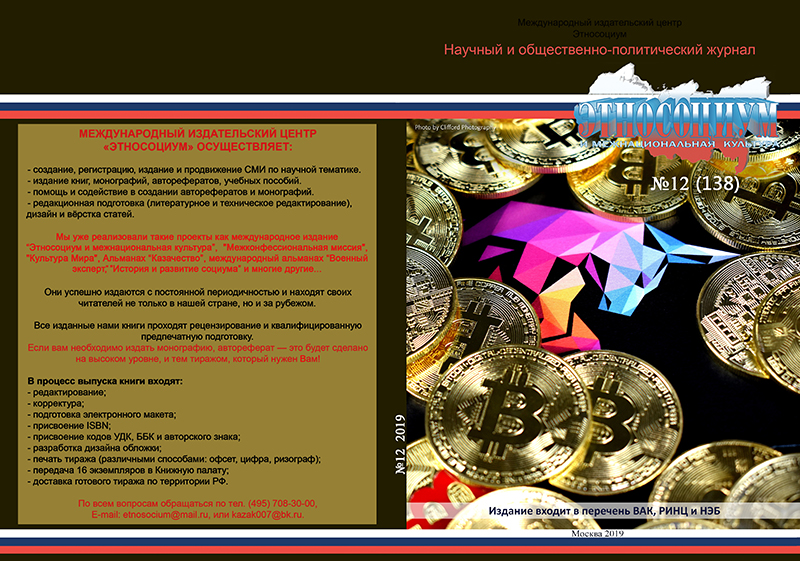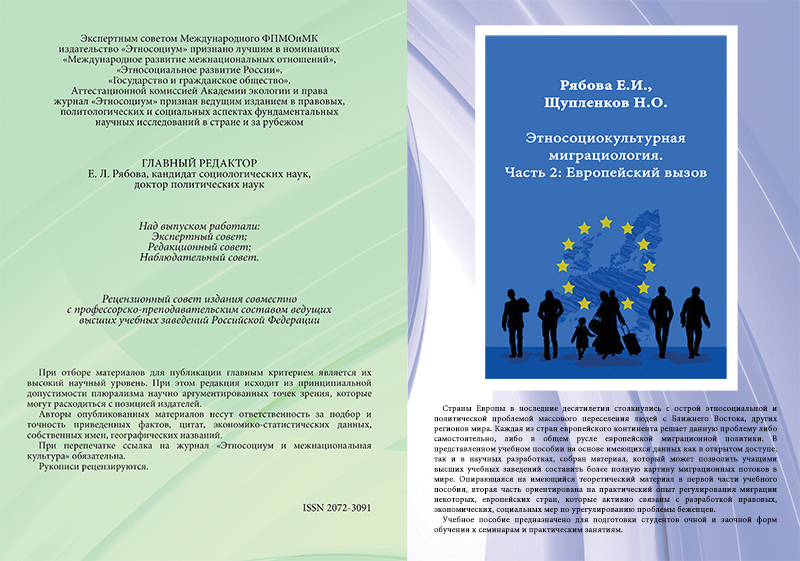

Content
|
COUNCIL OF INTERNATIONAL RELATIONSHIP
|
|
|
Gereykhanov G.P. "Regional Islamic Studies"
|
9
|
|
ACTUAL PROBLEMS OF MODERN SOCIETY
|
|
|
Omelaenko V.V. Current discussions on liberalism in Russia
|
12
|
|
Ponyaev I.M. Genesis factors of political conflict of 1993
|
30
|
|
REGIONAL STUDY
|
|
|
Adzhieva Z.I., Chomaeva Z.M., Tekeyeva L.D. Formation of the control and supervisory bodies in the first decades of the soviet authority (on the example of the Karachaya autonomous region)
|
42
|
|
Kalabekova S.V. Functions of advertising in a consumer society
|
50
|
|
Adzhieva Z.I., Kuncheva F.G. Archaeological research in the territory of Karachai and Circassia in the first years of USSR
|
58
|
|
Baykhanov I.B. Influence of information technologies on the character of political communications
|
64
|
|
NTERNATIONAL RELATIONSHIPS
|
|
|
Le Lan Ngok Benefits of promoting a country's image through politicians
|
72
|
|
Ormonova A.T. Development of economic cooperation between the Kyrgyz Republic and the Republic of Korea
|
76
|
|
Maximova D.D. The Arctic in 2035: from confrontation to cooperation
|
92
|
|
Abstracts
|
102
|
|
Authors
|
111
|
|
Requirements to materials submitted to the international publishing house "Etnosocium"
|
113
|
The presented textbook is of scientific and practical interest for the training of specialists at the federal and regional levels who are involved in understanding the problems of national security, in developing new conceptual foundations of the religious and cultural policy of the state, taking into account the Islamic factor.
Keywords: culture, politics, region, educational institution, general cultural.
The review analyses the contents of the book "Dimensions and Challenges of Russian Liberalism: Historical Drama and New Perspectives", published in English at Springer in 2019. It presents articles reflecting the main topics and areas of discussion about the history and modern state of liberal thought in Russia. The work is divided into four parts, which set out the main stages of the development of liberal ideology from the time of the Russian Empire to the debate of recent years.
Keywords: liberalism, social philosophy, political philosophy, Russian liberalism, political movements, ideology, political culture, Russian society, reforms, modernization.
The article presents the analysis of the political conflict genesis factors of 1993 in Russia. The study is significant due to the fact that the understanding of the genesis conflict factors will allow to understand the contemporary dynamics of Russian political development. The aim of the study is to provide a list of factors that determined political conflict of 1993. Materials of the study represent the set of the theories of conflict, data about events of 1970-1993, as well as scientific researches of the society development during this period. The main results of the study include the fact that this conflict was largely predetermined by the Soviet Uniondevelopment, and later transition to a policy of democratization; simultaneously, reduction of the government political and social influence; continuing lack of political pluralism, and expanding bureaucracy; the involvement of the RSFSR to the open information society, which was accompanied by the broadcasting through the media distorted the liberal democratic values; the fall of iron curtain; expanding of liberal democratic values among the population; executive power usage of the information resources with the aim of support for democratic views; the implementation of the executive power of neo-liberal policies instead of liberal, which was opposite to social and communist views of the parliament. Thus, it can be argued that political conflict 1993 was inevitable in view of the prevailing circumstances. While historical persons have just represented the flowing of socio-political changes. At the same time, the crisis was a conflict between liberal and social values.
Keywords: conflict of 1993, political crisis, Russia, genesis factors.
The article is devoted to the topic of the formation of the Soviet law enforcement bodies of the KAO. The authors consider the course of formation, functions, activities, structure of such bodies, the nature of their livelihoods, the justice department of the Karachaevsky district, the apparatus of the justice department. It seems that special attention is paid to the state executive bodies that performed supervisory and law enforcement functions.
Keywords: Department of Justice, provision on prosecutorial supervision, department of internal affairs, People’s Commissariat of Justice, apparatus of regional prosecutors.
The Object of the article is the phenomenon of advertising, and the subject – the function of advertising. Social, symbolic, integrating functions of advertising, its property to operate with symbols and signs are investigated. The contradictory influence of advertising on consciousness and behavior of individuals is considered, its positive and negative impact on society is traced. The property of advertising to be a symbol, and as such to determine the nature of social action. The article shows the demand for advertising by the consumer society, analyzes its role in the approval of the way and style of life. The ontological principles of dialectics, which allowed to study the social nature of advertising and its functions, served as a methodological basis. Scientific novelty consists in the substantiation of a number of theses: 1) advertising has both real and symbolic properties: 2) the symbolic meaning of advertising is that it forms a specific media space in which things and relations about things acquire the meaning of signs, which often replace reality.
Keywords: advertising, consumer society, information, referent, status, social indicator, brand, simulacrum, symbol, manipulation.
Considering the important stage in the formation of Soviet archeology, the author of the article highlights the most significant exploration and excavation from the 1920s to 1941 and summarizes the role of museums, educational institutions, central research organizations in the study of archaeological sites in Karachay and Cherkessia.
Keywords: archaeological sites, historical and cultural heritage, archaeological science, archaeological research, scientific societies.
The nature of political communications is rapidly changing with the development of computer technologies that allow for high-speed communication between political actors, regardless of time and space, with the goal of actively implementing both traditional communication models and specific ones existing in the virtual space. Modern information technologies have great political and managerial potential, which significantly changes the degree of information support for political decision-making processes at all levels of government.
Keywords: information technologies, political communications, information, state information policy.
This article discusses the formation and promotion of the country's image. Of particular importance is the promotion of the image of the state through the politicians representing it. The main advantages of this method of promoting the country's image are given.
Keywords: country image, politician, political leader, image promotion, image building.
The article discusses the history of formation, development process and features of economic cooperation of the Kyrgyz Republic and the Republic of Korea from 1992 to 2018. The process of cooperation in the economic sphere is divided into three stages based on quantitative and qualitative changes in each period. The distinctive characteristics of these periods are emphasized.
Keywords: Kyrgyz Republic, Republic of Korea, economic cooperation, development history.
To know what will be in 18 years is not an easy task in the light of today's multifaceted agenda on the world stage. But now we can say that international relations are developing in a regional context. Moreover, the regionalization is more associated with globalization. Regionalism has already become an important factor in the formation of foreign and internal policies, which take into account the geopolitical, geo-economic and socio-cultural characteristics of the territory. And globalization for a long time will remain the main process of world development, in which there will be an internationalization of all activities of society. By 2035, the prevailing trend will be the concentration of the world community on world`s certain regions that have prospects for the development of relations at the interstate, interregional level, as well as arousing interest among transnational corporations. And among these regions can be called the Arctic.
Keywords: Arctic, 2035, Canada, Russia, international relations, Northern Sea Route.